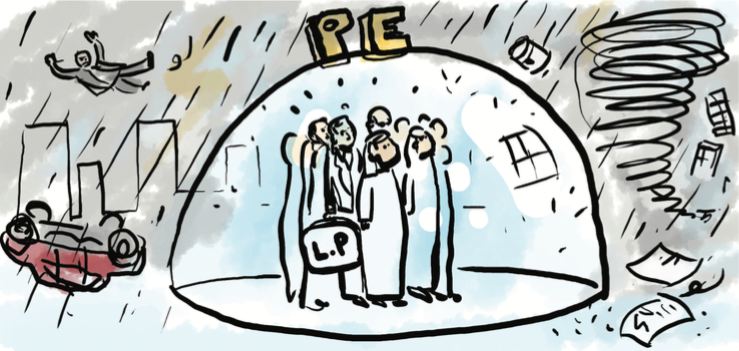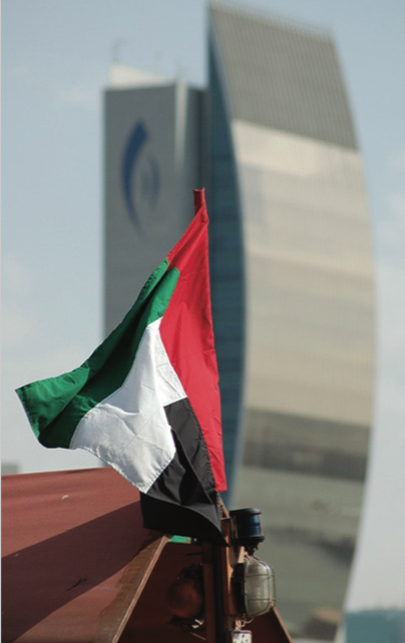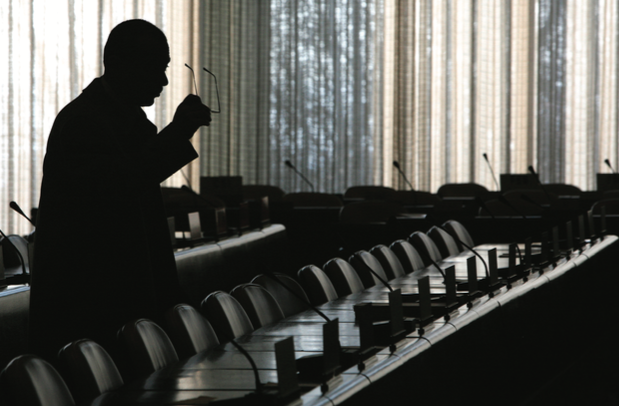Unlike buying a few shares in a public company, private equity (PE) investment is a commitment that cannot be taken lightly. That is perhaps why most experts believe some two-thirds of institutional PE investors are on the sidelines waiting for better days. Who can blame them? Just like any other asset class in the region, PE is still licking its wounds after the beating that it took from the public markets, not to mention the de-leveraging costs that PE firms and portfolio companies across the region continue to shoulder as they brace themselves for a dismal year to come. Accordingly, it’s little wonder that most institutional investors who are willing to deploy money would rather consider more liquid investment options than further investment in PE, even at current market valuations.
“The nature of the private equity funds, reputed for their long term investment horizon, is not an attractive attribute for today’s investors who value liquidity,” says Rami Bazzi, senior executive officer at Injazat Capital.
The ensuing atmosphere in the region has become one of understanding between firms and limited partners (LPs) about capital commitments that were expected to be called over the past six months or in the foreseeable future.
“We told our LPs in November [2008] ‘be comfortable and relax… we are not going to be making any capital calls before we talk to you first because we don’t want to put you in an embarrassing situation of making a capital call that you can’t meet,’” says Ammar Al Khudairy, managing director & CEO of Amwal Al Khaleej Investment Co. Ironically, much of the stress on PE firms to make capital calls and on LPs to meet them has been lifted due to the systemic effects of the economic downturn.
“LPs would have defaulted initially [had capital been called], but deal making has reduced considerably considering the situation with LPs. At the same time, PE funds would not want to be at risk of signing a deal for which the funding may not come through thus jeopardizing the entire fund itself,” says Tamer Bazzari, deputy CEO of Rasmala.
To call or not to call
Nonetheless, it has already been around six months since this ‘period of understanding’ began. Since then, most PE firms have managed to hold off on making capital calls, but others have had no choice but to make that untimely call.
“At least one group has told us in January that they had frozen investment and made a capital call and only came up with 90 percent of the call. With regards to the other 10 percent, the investor just said ‘we can’t do it,’” says Benjamin Newland, partner at King and Spalding, a multinational law firm that consults in the regional PE market. The phenomenon of defaulting is indicative of a wider problem in the PE sector.
“There is going to be a ‘point of pain’ going forward for the PE industry, which is LPs being unable to fulfill their capital call obligations because of their own liquidity issues,” says Yahya Jalil, senior executive officer and head of private equity at The National Investor.
Robert Hall, head of transaction services Middle East & South Asia at KPMG, adds that “some LPs will continue to provide cash and there will be others who will refuse to make further capital calls and legal action will be taken against those.”
Having to deal with the liquidity issues of LPs is undoubtedly going to be a battle that will be waged until the end of this downturn. Nevertheless, PE firms will have to make nice with LPs whether they like it or not because, at the end of the day, firms will have to coax them into investing in an intrinsically illiquid sector at a time when cash is king.
“In an asset allocation waterfall where fixed income instruments receive most of the money… PE happens to be at the end of the asset allocation priority. Very clearly, not many LPs want to take additional risk in order to generate additional returns, when normal levels of return… are at risk,” says Bazzari. “Investors are seeking liquid investments to enable them to re-allocate when needed, a luxury private equity investments do not normally provide,” he continues.
Even institutional investors that have already committed to the PE sector will by default commit less money to the sector. “If a family conglomerate or a large institution has a target allocation for PE which is eight to 10 percent, and the value of their public portfolio shrinks, that eight to 10 percent will also shrink into a smaller base for PE with much fewer dollars [sic],” says Jalil.
In reality the current gap between the interests of general partners (GPs) and LPs was a long time in the making and despite the fact that there will be much friction in the next cycle, this is not necessarily a bad thing. PE in the region has to some extent been a victim of its own success, especially in the last three years. According to research conducted by Zawya Private Equity Monitor (ZPEM) and the Gulf Venture Capital Association (GVCA) of the total investments made in the PE sector over the last decade, approximately 86 percent were made in the last three years (2006 to 2008), with approximately 39 percent and 27 percent made in 2007 and 2008, respectively. While 27 percent in 2008 is still an admirable figure in terms of growth, it is symptomatic of a downward trend that is now manifesting itself in the industry.
Private equity activity in the MENA region has declined in 2008, both in total size and in number — 31 percent and 22 percent, respectively — according to ZPEM and the GVCA. Growing at such break-neck speeds — a CAGR of 48 percent in the past three years — has resulted in GPs charging almost exorbitant management fees and carrying commissions, while LPs were fishing for multiples that were out of sync with what the market could sustain in the medium to long term.
But as investment appetite has all but dried up, GPs are realizing that they can no longer afford to maintain a predominately opportunistic attitude towards their investors.
“Investors and LPs will be looking for a greater level of alignment of interests which will come in several respects. LPs will require GPs to have more ‘skill in the game’ and more of their own money alongside that of LPs, not just to be asset managers but also to have principle investments,” says Hisham El-Khazindar, managing director and co-founder of Citadel Capital. “There is going to be some pressure on management fees, particularly for the larger funds, as investors ask for the management fees to come down and harder return on investment (ROI) hurdles before PE firms are allowed to carry.”
As far as carries are concerned, the more intertwined the interests of funds and investors become, the less this becomes an issue.
“I don’t think anyone will be negotiating carries now because everyone realizes that there is a full alignment of interests,” says Al Khudairy. In the second quater of 2009 the PE industry will have to reconcile with the idea that unless mutual interests converge, many GPs could find themselves looking for a new profession.







